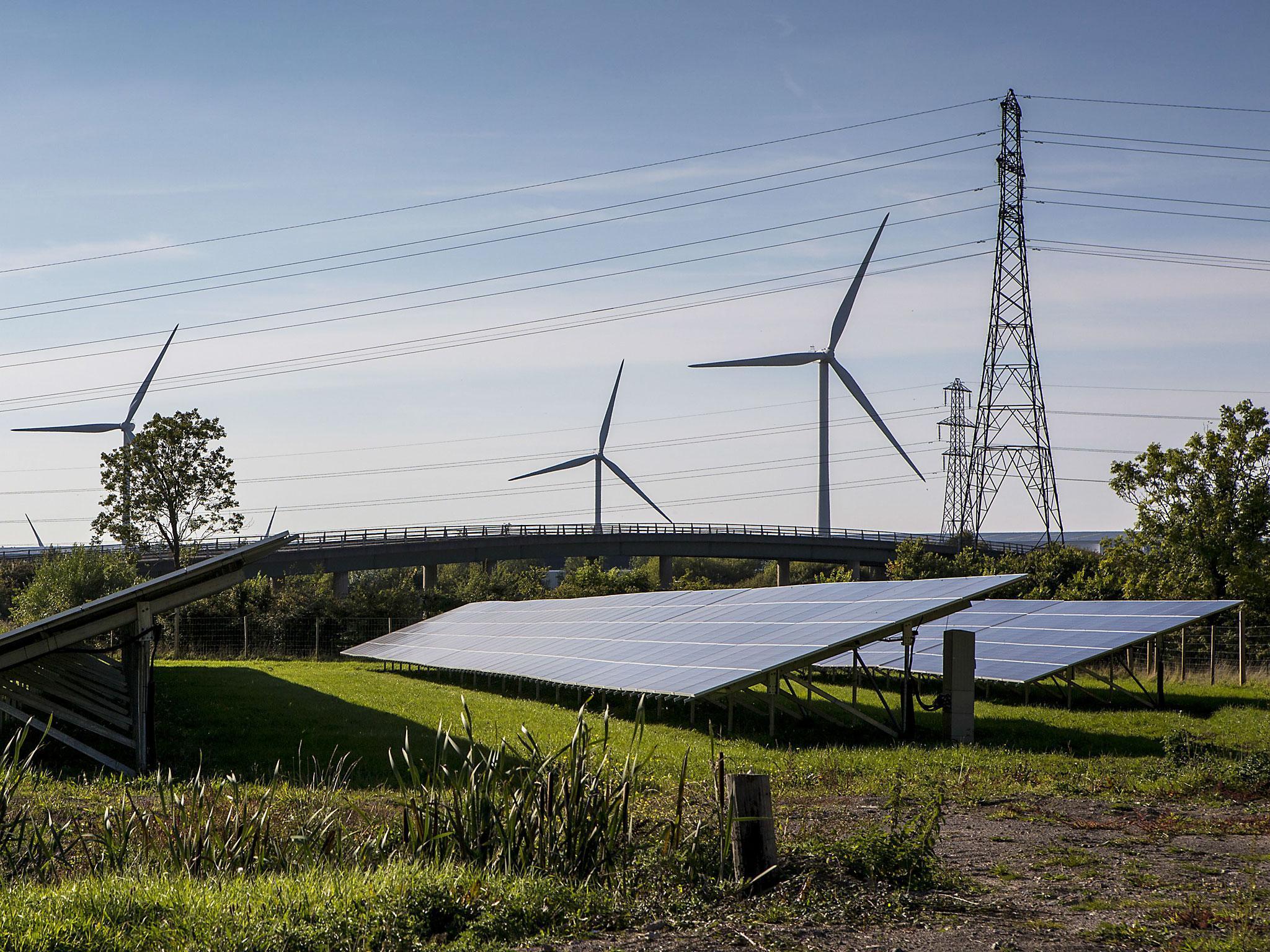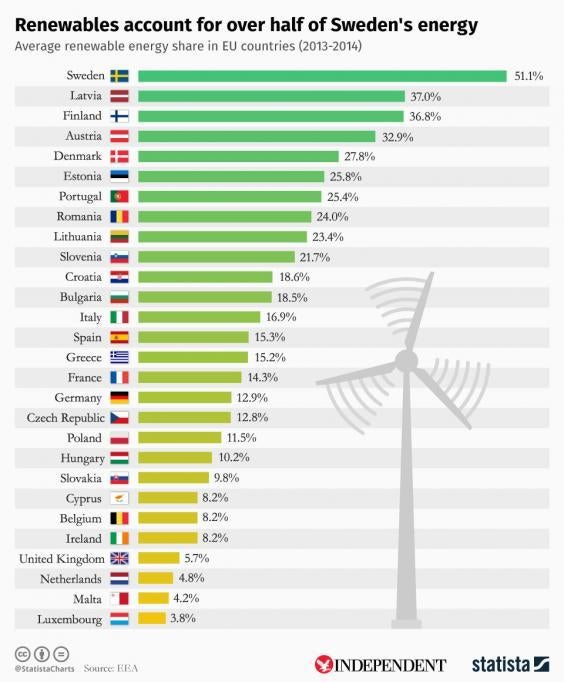Environmental policies are driving down consumer energy bills, experts say
'Action to deliver a cleaner, more efficient energy system is already delivering benefits for households and businesses'

Your support helps us to tell the story
From reproductive rights to climate change to Big Tech, The Independent is on the ground when the story is developing. Whether it's investigating the financials of Elon Musk's pro-Trump PAC or producing our latest documentary, 'The A Word', which shines a light on the American women fighting for reproductive rights, we know how important it is to parse out the facts from the messaging.
At such a critical moment in US history, we need reporters on the ground. Your donation allows us to keep sending journalists to speak to both sides of the story.
The Independent is trusted by Americans across the entire political spectrum. And unlike many other quality news outlets, we choose not to lock Americans out of our reporting and analysis with paywalls. We believe quality journalism should be available to everyone, paid for by those who can afford it.
Your support makes all the difference.The average consumer has saved £115 a year on their energy bills since the Government committed to legally binding targets to reduce greenhouse gas emissions, according to a new analysis by the Government’s climate change advisers.
Annual gas and electricity bills rose by about £370 between 2004 and 2008, the year the Climate Change Act was passed, as fossil fuel prices soared.
But since then bills had fallen by £115 to £1,160 a year, the Committee on Climate Change (CCC) found.
While subsidies for renewable electricity had added about £9 a month to typical bills in 2016, this was more than off-set by a saving of more than £20 a month as a result of energy-efficient light bulbs and appliances.
In a report, the CCC said increasing the amount of low-carbon electricity could add up to an extra £10 a month to bills if policies to meet the UK’s emissions targets were put in place. But further improvements in energy efficiency could reduce bills by about £12.50 a month, producing a net saving.
John Gummer, the former Conservative politician who is now Lord Deben and chair of the CCC, said: “Action to deliver a cleaner, more efficient energy system is already delivering benefits for households and businesses.
“UK emissions are falling – down 38 per cent from 1990 to 2015 – while gross domestic product has risen by almost 65 per cent in the same period.
“Meanwhile, the typical household energy bill has fallen in real terms since 2012.
“The UK’s progress to reduce emissions, and its comparative advantage in important areas such as the automotive sector, offer opportunities for future growth and employment while delivering vital action to tackle climate change.”
The report highlighted the importance of boosting competition between energy suppliers, saying households that switched to the lowest available tariff could save between £200 and £300 a year.
It suggested Government support for energy efficiency schemes could be targeted at the poorest.
“If the insulation and low-carbon heat installations required to meet the carbon budgets can be successfully targeted at the fuel poor then around three-quarters can be lifted out of fuel poverty by 2030,” the report said.
“However, meeting the Government’s goal of improving fuel poor homes to efficiency band C by 2030 would require roughly doubling the funding currently provided under the Energy Company Obligation.”
The CCC said the shift to a low-carbon economy “presents opportunities for UK business” and this “must be integral to the Government’s new industrial strategy”.

“The UK low-carbon economy is already estimated to employ hundreds of thousands of people and contribute around two to three per cent of GDP, which is a comparable size to energy-intensive manufacturing. It has been growing faster than the rest of the economy,” it said.
“Following the Paris Agreement, global demand for low-carbon goods and services is set to expand many times over to 2030 and then again to 2050.
“UK businesses must adapt to meet this need in place of the declining demand for high-carbon goods and services.
“The UK is particularly well-placed to take advantage of growing global markets for low emission vehicles; low-carbon finance, insurance and consulting; low-carbon electricity; smart grids and energy efficient products.
“Reducing emissions also brings important co-benefits, particularly for health, resulting from improved air quality, better housing, reduced noise and more active transport (eg walking and cycling).”
Richard Black, director of the Energy and Climate Intelligence Unit (ECIU) said the report contained “good news for Britain’s ordinary working families”.
“It shows that energy policies have lowered people’s bills,” he said.
“Policies to cut energy waste and carbon emissions have largely worked, and householders have pocketed the benefits from falling energy use and more efficient products, like lights and TVs.
“Even better, this is set to continue – provided Government cracks on with the job of introducing new energy efficiency policies.
“The UK lags well behind many other developed nations in boosting energy efficiency, which is often the lowest hanging fruit on the policy tree, and doing so effectively would give UK plc a leg-up on international competition.”
Rebecca Williams, an energy specialist at environmental group WWF, said the report’s finding belied the fossil fuel industry’s claim that switch to a low-carbon economy was making energy too expensive.
“This report shows that energy companies are wrong to blame the increase in energy bills solely on UK Government policies. It is clear that the main driver here is rising fossil fuel costs,” she said.
“Innovation is driving down the costs of producing low-carbon energy and UK Government policies to improve energy efficiency are also bringing down bills.
“These UK Government policies are a small price worth paying to bring cleaner air and new jobs to the UK.”
And Friends of the Earth energy campaigner Simon Bullock said the CCC’s report was evidence that the UK could “tackle climate change and have lower energy bills”.
“That’s a massive win-win for consumers and our environment,” he said.
“But the UK still has some of the most heat-leaking housing in Europe, and measures to help households improve their energy efficiency have been slashed in recent years. This must be reversed in the Government’s imminent new climate change strategy.
“The cost of renewables keeps on falling, with onshore wind already cheaper than new gas power stations, and large-scale solar is hot on its heels.”
Iain Wright, who chairs the Common’s Business, Energy and Industrial Strategy Committee, stressed that security of energy supply was “paramount” as many power plants come to the end of their working life.
“It is important that new sources of energy are brought into play. This must include renewable energy, not only to replace capacity but also to move to a low-carbon economy,” he said.
“Given that energy capacity needs to be replaced, the big energy companies are too quick to blame green policies from Government for unjustifiable price increases which hit their most loyal customers hardest. These consumers should heed the report’s advice and switch suppliers.
“The Government must also be mindful of the burden that decarbonisation policies can place on businesses and ensure that they are able to remain competitive.
“There are enormous opportunities in the UK moving to a low-carbon economy and Ministers must take maximum advantage of these by making the transition integral to its Industrial Strategy.”
Join our commenting forum
Join thought-provoking conversations, follow other Independent readers and see their replies
Comments